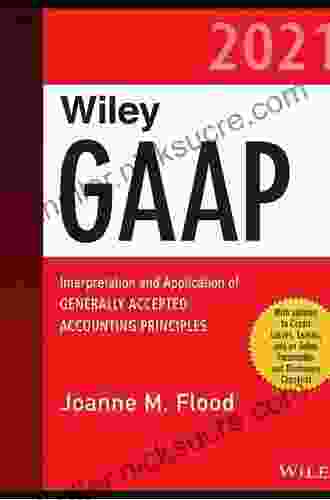Interpretation and Application of Generally Accepted Accounting Principles: A Comprehensive Guide

Generally Accepted Accounting Principles (GAAP) are the standards and guidelines that govern the preparation of financial statements and the accounting profession. They ensure the accuracy, reliability, and consistency of financial information reported by companies and organizations. This article provides a comprehensive guide to the interpretation and application of GAAP, covering its history, components, and practical implications.
History of GAAP
The roots of GAAP can be traced back to the 19th century when the development of joint-stock companies and the need for transparency led to the establishment of accounting standards. In the United States, the American Institute of Certified Public Accountants (AICPA) took the lead in developing GAAP through its Committee on Accounting Procedure (CAP) in the 1930s.
4.4 out of 5
| Language | : | English |
| File size | : | 16970 KB |
| Text-to-Speech | : | Enabled |
| Enhanced typesetting | : | Enabled |
| Word Wise | : | Enabled |
| Print length | : | 1380 pages |
| Lending | : | Enabled |
| Screen Reader | : | Supported |
After World War II, the Securities and Exchange Commission (SEC) became involved in regulating the financial reporting of publicly traded companies, which further contributed to the development and standardization of GAAP. In 1973, the Financial Accounting Standards Board (FASB) was established as the independent body responsible for setting GAAP in the United States.
Components of GAAP
GAAP consists of several components that guide the accounting process and the preparation of financial statements:
* Conceptual Framework: Provides the underlying principles and concepts that form the basis for GAAP. * Accounting Standards: Detailed rules and guidelines that prescribe specific accounting treatments for various transactions and events. * Financial Reporting Framework: Specifies the structure and content of financial statements, including the balance sheet, income statement, statement of cash flows, and statement of equity. * Disclosure Requirements: Mandate the inclusion of relevant information in financial statements to ensure transparency and completeness.
Interpretation and Application of GAAP
The interpretation and application of GAAP involve several key principles:
* Relevance: Financial information presented in the financial statements should be meaningful and relevant to the users. * Reliability: Financial information should be accurate, verifiable, and unbiased. * Consistency: Companies should consistently apply GAAP from period to period to enable comparability of financial results. * Materiality: Only material information that has the potential to influence the decisions of users should be included in financial statements. * Good Faith: Accountants should exercise professional judgment and act in good faith when applying GAAP to ensure that financial statements fairly represent the financial position and performance of an organization.
Practical Implications of GAAP
GAAP has significant practical implications for businesses, investors, and other stakeholders:
* Financial Reporting: GAAP provides the framework for the preparation of accurate and reliable financial statements, which are used by investors, creditors, and other parties to assess a company's financial health and performance. * Taxation: GAAP may influence the calculation of taxable income, affecting a company's tax liability. * Regulation: Publicly traded companies are required to comply with GAAP, which ensures transparency and accountability in the capital markets. * Investor Protection: GAAP provides investors with reliable and comparable financial information, enabling them to make informed investment decisions. * Audit Process: Auditors rely on GAAP to evaluate the accuracy and fairness of financial statements.
International GAAP
In addition to the U.S. GAAP, there are several other sets of GAAP used around the world. The International Financial Reporting Standards (IFRS) are a set of global accounting standards developed by the International Accounting Standards Board (IASB). IFRS is increasingly adopted by companies in jurisdictions outside of the United States.
Advantages of GAAP
* Consistency: GAAP ensures that financial statements are prepared using the same standards, enabling comparability across companies and industries. * Reliability: GAAP promotes the accuracy and reliability of financial information, providing confidence to users. * Transparency: GAAP requires the disclosure of relevant information, enhancing transparency and accountability. * International Acceptance: IFRS is gaining global acceptance, facilitating the comparability of financial statements across borders.
Challenges of GAAP
* Complexity: GAAP can be complex and difficult to interpret, especially for non-financial professionals. * Subjectivity: Some GAAP principles may involve subjective judgments, which can lead to inconsistencies in application. * Cost: Complying with GAAP can be costly for businesses, especially small enterprises. * Relevance: GAAP may not always adequately address emerging business models or transactions.
The interpretation and application of Generally Accepted Accounting Principles (GAAP) are crucial for the preparation of accurate, reliable, and consistent financial statements. GAAP provides a framework for accounting practices that ensures transparency, protects investors, and facilitates economic decision-making. Understanding the principles and components of GAAP is essential for accountants, financial analysts, and all stakeholders who rely on financial information.
As GAAP continues to evolve and adapt to the changing business environment, it is important for organizations to stay updated on the latest developments to ensure compliance and maintain the integrity of their financial reporting.
4.4 out of 5
| Language | : | English |
| File size | : | 16970 KB |
| Text-to-Speech | : | Enabled |
| Enhanced typesetting | : | Enabled |
| Word Wise | : | Enabled |
| Print length | : | 1380 pages |
| Lending | : | Enabled |
| Screen Reader | : | Supported |
Do you want to contribute by writing guest posts on this blog?
Please contact us and send us a resume of previous articles that you have written.
 Fiction
Fiction Non Fiction
Non Fiction Romance
Romance Mystery
Mystery Thriller
Thriller SciFi
SciFi Fantasy
Fantasy Horror
Horror Biography
Biography Selfhelp
Selfhelp Business
Business History
History Classics
Classics Poetry
Poetry Childrens
Childrens Young Adult
Young Adult Educational
Educational Cooking
Cooking Travel
Travel Lifestyle
Lifestyle Spirituality
Spirituality Health
Health Fitness
Fitness Technology
Technology Science
Science Arts
Arts Crafts
Crafts DIY
DIY Gardening
Gardening Petcare
Petcare Kathleen Cushman
Kathleen Cushman Varg Freeborn
Varg Freeborn Loyd Ellis
Loyd Ellis Melinda Tankard Reist
Melinda Tankard Reist Pedro Sarmiento De Gamboa
Pedro Sarmiento De Gamboa Brian R King
Brian R King Matt Schifferle
Matt Schifferle Timothy A Sisemore
Timothy A Sisemore Martin Sternstein
Martin Sternstein George Olsen
George Olsen Dan Washburn
Dan Washburn Porter Shimer
Porter Shimer Jackson T Markbrown
Jackson T Markbrown Daniel Bergner
Daniel Bergner Karen Wilkinson
Karen Wilkinson Joan Nathan
Joan Nathan Brian Reddington
Brian Reddington Scott Hawthorn
Scott Hawthorn Estelle Dautry
Estelle Dautry Sandra M Nettina
Sandra M Nettina D Enette Larson Meyer
D Enette Larson Meyer Rachel Mcgrath
Rachel Mcgrath Kalynn Bayron
Kalynn Bayron Eric R Dodge
Eric R Dodge John Jeffries Martin
John Jeffries Martin Ksenia K
Ksenia K Phyllis Books
Phyllis Books Dan Jones
Dan Jones Alan D Moore
Alan D Moore Brian Noyes
Brian Noyes Thomas A Jacobs
Thomas A Jacobs William Albert Robinson
William Albert Robinson Maggie Dallen
Maggie Dallen Richard Hingley
Richard Hingley Dawna Markova
Dawna Markova Neil S Jacobson
Neil S Jacobson Sunil Tanna
Sunil Tanna Mariana Monteiro
Mariana Monteiro Rick Steves
Rick Steves Adam Night
Adam Night Harold Gatty
Harold Gatty Steve Oakes
Steve Oakes Nehemia Gordon
Nehemia Gordon Dinesh Kumar Goyal
Dinesh Kumar Goyal Martin A Lee
Martin A Lee Jp Kriya
Jp Kriya Steve Guest
Steve Guest Jeremy J Baumberg
Jeremy J Baumberg Inger Mewburn
Inger Mewburn Kicki Hansard
Kicki Hansard Elizabeth Dupart
Elizabeth Dupart Ilchi Lee
Ilchi Lee Inge Bell
Inge Bell Richard A Jaffe
Richard A Jaffe Patrick Garbin
Patrick Garbin Sonja Schwartzbach
Sonja Schwartzbach Gene Kritsky
Gene Kritsky Mike Weatherstone
Mike Weatherstone Khalid Khashoggi
Khalid Khashoggi Cassandra Overby
Cassandra Overby Don L Gates
Don L Gates Julie Cangialosi
Julie Cangialosi Lucy Hopping
Lucy Hopping James Miller
James Miller Ji Kim
Ji Kim J C Cervantes
J C Cervantes Diana J Mason
Diana J Mason Janice L Raymond
Janice L Raymond Gabriel F Federico
Gabriel F Federico Jean Nayar
Jean Nayar Milne Cc Pocock
Milne Cc Pocock Susan F Paterno
Susan F Paterno Peggy Kaye
Peggy Kaye Lisa Druxman
Lisa Druxman Bernard Darwin
Bernard Darwin Kate S Martin
Kate S Martin Scott Zimmerman
Scott Zimmerman Jeremy Bradstreet
Jeremy Bradstreet Larry A Yff
Larry A Yff Matt Parker
Matt Parker David Schoem
David Schoem Grace Mccready
Grace Mccready Brett Cohen
Brett Cohen Steven Shapin
Steven Shapin Chuck Callaway
Chuck Callaway Mahmood Mamdani
Mahmood Mamdani Patty Wipfler
Patty Wipfler Rahul Jandial
Rahul Jandial Santari Green
Santari Green Clyde Soles
Clyde Soles Kent Hoffman
Kent Hoffman Ivan Savov
Ivan Savov Patricia Wooster
Patricia Wooster Jason Brick
Jason Brick Richard Post
Richard Post Jeannette De Wyze
Jeannette De Wyze Steve Wiegand
Steve Wiegand Cindy Margolis
Cindy Margolis Krishna Godhania
Krishna Godhania Keith Ammann
Keith Ammann Debra Fine
Debra Fine Megan Kelley Hall
Megan Kelley Hall T D Wilson
T D Wilson Lana Peek
Lana Peek Carol Newell
Carol Newell Arthur Scott Bailey
Arthur Scott Bailey Joyce Harper
Joyce Harper Einat L K
Einat L K Sara Elliott Price
Sara Elliott Price Zigzag English
Zigzag English Jacqueline Houtman
Jacqueline Houtman S Connolly
S Connolly Soong Chan Rah
Soong Chan Rah Jeannie Burlowski
Jeannie Burlowski Richard Blais
Richard Blais Elwyn Hartley Edwards
Elwyn Hartley Edwards Kathleen Bartholomew
Kathleen Bartholomew Grace Mariana Rector
Grace Mariana Rector Denise Long
Denise Long Derek Blasberg
Derek Blasberg Carol Dawson
Carol Dawson Steve Bromley
Steve Bromley Brian Kilmeade
Brian Kilmeade James Zug
James Zug Robin Dunbar
Robin Dunbar Marc Bona
Marc Bona Keith Ryan Cartwright
Keith Ryan Cartwright Brett Hull
Brett Hull David Hackett Fischer
David Hackett Fischer Htebooks
Htebooks Mark Howard
Mark Howard Eric C Lindstrom
Eric C Lindstrom Daniel Vaughan
Daniel Vaughan 1st Ed 2018 Edition Kindle Edition
1st Ed 2018 Edition Kindle Edition Tobe Melora Correal
Tobe Melora Correal Loan Le
Loan Le Emily Lauren Dick
Emily Lauren Dick John Wesson
John Wesson Kaylene Yoder
Kaylene Yoder Jennifer Block
Jennifer Block James M Jones
James M Jones James Dean
James Dean Mitchel P Roth
Mitchel P Roth Nate Allen
Nate Allen Seb Falk
Seb Falk Charles Todd
Charles Todd T J Tomasi
T J Tomasi Mary Strand
Mary Strand Joseph Ewing
Joseph Ewing Vincent W Davis
Vincent W Davis Heather Rose
Heather Rose Esther Hicks
Esther Hicks Nicholas Bjorn
Nicholas Bjorn Grace Friedman
Grace Friedman Bruce Lee
Bruce Lee Ted Franklin Belue
Ted Franklin Belue Steven Verrier
Steven Verrier Michael Shaw
Michael Shaw Stephanie Sarkis
Stephanie Sarkis David M Ewalt
David M Ewalt Emilee Day
Emilee Day Kenneth Paul Rosenberg
Kenneth Paul Rosenberg Mark Lazerus
Mark Lazerus Jez Cajiao
Jez Cajiao Luis Angel Echeverria
Luis Angel Echeverria Lee Mcintyre
Lee Mcintyre Michael Barkun
Michael Barkun Eric Michael
Eric Michael Paul Farmer
Paul Farmer Jessica Minahan
Jessica Minahan Patti Henry
Patti Henry Matt Doeden
Matt Doeden Diane Ravitch
Diane Ravitch Alex Horne
Alex Horne John Cooper
John Cooper Ian Tuhovsky
Ian Tuhovsky Ned Mcintosh
Ned Mcintosh Douglas R Hofstadter
Douglas R Hofstadter David Flanagan
David Flanagan Dr Lena Edwards
Dr Lena Edwards Nick Heil
Nick Heil Tom Cunliffe
Tom Cunliffe Jd Tanner
Jd Tanner Jennifer Comeaux
Jennifer Comeaux Gerald R Allen
Gerald R Allen Jodi Aman
Jodi Aman Elizabeth Davis
Elizabeth Davis Mohammad F Anwar
Mohammad F Anwar Leslie Valiant
Leslie Valiant Ernle Bradford
Ernle Bradford Robert Wright
Robert Wright Brian W Kernighan
Brian W Kernighan Rory D Nelson
Rory D Nelson David Mcclung
David Mcclung Jay Asher
Jay Asher Lisa Scottoline
Lisa Scottoline E G Richards
E G Richards Nicholas S Howe
Nicholas S Howe Ann Imig
Ann Imig Caitlin Flanagan
Caitlin Flanagan Genevieve Bardwell
Genevieve Bardwell Samantha Michaels
Samantha Michaels Marco Polo
Marco Polo Matt Wastradowski
Matt Wastradowski Xavier Wells
Xavier Wells Douglas Wood
Douglas Wood Mark Powell
Mark Powell Shayla Black
Shayla Black Nicole Morales Lm Cpm
Nicole Morales Lm Cpm D Levesque
D Levesque Janae M Robinson
Janae M Robinson Peter Wacht
Peter Wacht Colette Harris
Colette Harris Maurice Herzog
Maurice Herzog Matt Davids
Matt Davids Natalia Ilyin
Natalia Ilyin Rich Osthoff
Rich Osthoff James Floyd Kelly
James Floyd Kelly Kathleen Taylor
Kathleen Taylor Rob Coppolillo
Rob Coppolillo J F James
J F James Shannon Warden
Shannon Warden Molly Caldwell Crosby
Molly Caldwell Crosby Michael Ruhlman
Michael Ruhlman Michael O Emerson
Michael O Emerson Stephen Wood
Stephen Wood Chukwuma Eleodimuo
Chukwuma Eleodimuo Paula Brackston
Paula Brackston Melissa Trevathan
Melissa Trevathan Lori Lyons
Lori Lyons Erin Mckittrick
Erin Mckittrick Roshani Chokshi
Roshani Chokshi J R Mathews
J R Mathews Peter Allison
Peter Allison Sarah Kleck
Sarah Kleck Calvin Trillin
Calvin Trillin Damien Cox
Damien Cox Brittany Cavallaro
Brittany Cavallaro Bruce A Fenderson
Bruce A Fenderson Matthew Desmond
Matthew Desmond Dr Monique Thompson Dha Lpc
Dr Monique Thompson Dha Lpc Jane Albert
Jane Albert Dr Nanhee Byrnes
Dr Nanhee Byrnes Tim Falconer
Tim Falconer Laura A Jana
Laura A Jana Michael Sullivan Iii
Michael Sullivan Iii Maria Sharapova
Maria Sharapova Lenore Skenazy
Lenore Skenazy Linda Carter
Linda Carter Kate Mcmillan
Kate Mcmillan Gerald L Schroeder
Gerald L Schroeder Dave Cutcher
Dave Cutcher Elsevier
Elsevier Frederick L Coolidge
Frederick L Coolidge Natalia Rojas
Natalia Rojas Eze Ugbor
Eze Ugbor Nicholas Gallo
Nicholas Gallo Karen E Mcconnell
Karen E Mcconnell Fritjof Capra
Fritjof Capra Chuanwei Li
Chuanwei Li Jonathan Grix
Jonathan Grix Rick J Scavetta
Rick J Scavetta Nancy Boyd Franklin
Nancy Boyd Franklin Joseph Burbridge
Joseph Burbridge Bret Stetka
Bret Stetka Frederick Grinnell
Frederick Grinnell Michael A Tompkins
Michael A Tompkins F R Lifestyle
F R Lifestyle Claudia Gray
Claudia Gray Ronald M Rapee
Ronald M Rapee Lee Alan Dugatkin
Lee Alan Dugatkin Christine Brennan
Christine Brennan Peter Zuckerman
Peter Zuckerman John Connelly
John Connelly Jp Lepeley
Jp Lepeley E L Konigsburg
E L Konigsburg Lisa Leake
Lisa Leake David Hoffman
David Hoffman Jacques Vallee
Jacques Vallee Kevin Alexander
Kevin Alexander Ryan M Cleckner
Ryan M Cleckner Breanna Hayse
Breanna Hayse Edith Hall
Edith Hall George Case
George Case Clayton King
Clayton King Catherine Shainberg
Catherine Shainberg Joe Grant
Joe Grant Claudia M Gold
Claudia M Gold Jemar Tisby
Jemar Tisby Penny Alexander
Penny Alexander Jacob Boehme
Jacob Boehme Carol Walters
Carol Walters Smart Edition
Smart Edition Worth Books
Worth Books Kusha Karvandi
Kusha Karvandi Megan Smolenyak
Megan Smolenyak Harry Vardon
Harry Vardon John M Taylor
John M Taylor Bonnie Henderson
Bonnie Henderson Joanna Philbin
Joanna Philbin David Sinclair
David Sinclair Ron Lieber
Ron Lieber David Wootton
David Wootton Steven Hugg
Steven Hugg Lucia Guglielminetti
Lucia Guglielminetti Tim Dunn
Tim Dunn Grete Waitz
Grete Waitz Michael Sean Comerford
Michael Sean Comerford James Kaiser
James Kaiser Dusan Petkovic
Dusan Petkovic John A Fortunato
John A Fortunato Pastor Ahyh
Pastor Ahyh Phillip Stephen Schulz
Phillip Stephen Schulz Dave Ramsey
Dave Ramsey David Cannon
David Cannon Derick Lugo
Derick Lugo William Trubridge
William Trubridge Brian Everitt
Brian Everitt Steve Schwartz
Steve Schwartz Christy Teglo
Christy Teglo Danny Staple
Danny Staple Howtodressage
Howtodressage Joyce Bas
Joyce Bas David Barrett
David Barrett Mark Johnston
Mark Johnston Matt Morton
Matt Morton Geoffrey Simpson
Geoffrey Simpson John Mclachlan
John Mclachlan Thao Te
Thao Te Brion Toss
Brion Toss Peggy Tharpe
Peggy Tharpe David Barrie
David Barrie Christopher Ketcham
Christopher Ketcham Tom M Apostol
Tom M Apostol Henry Worsley
Henry Worsley Victor A Bloomfield
Victor A Bloomfield Guy P Harrison
Guy P Harrison Kevin Marx
Kevin Marx Brooks Blevins
Brooks Blevins Wil Fleming
Wil Fleming Jules Wake
Jules Wake Lindsey Schlessinger
Lindsey Schlessinger Kerry Mcdonald
Kerry Mcdonald Bobbi Conner
Bobbi Conner Patrick Carnes
Patrick Carnes Mike Eastman
Mike Eastman Kira Breed Wrisley
Kira Breed Wrisley John Major Jenkins
John Major Jenkins Michael Mason
Michael Mason Nachole Johnson
Nachole Johnson Guido W Imbens
Guido W Imbens Roman Gurbanov
Roman Gurbanov Phil Williams
Phil Williams Lily Raff Mccaulou
Lily Raff Mccaulou Brian Gewirtz
Brian Gewirtz John Mcenroe
John Mcenroe Cecilia Twinch
Cecilia Twinch Rob Vollman
Rob Vollman Mark J Ferrari
Mark J Ferrari Curtis Wilkie
Curtis Wilkie Leigh Pearson
Leigh Pearson J R Harris
J R Harris Murray Shukyn
Murray Shukyn Cpt Exam Prep Team
Cpt Exam Prep Team John Moren
John Moren Heyward Coleman
Heyward Coleman Charlie Francis
Charlie Francis Jim White
Jim White David Hatcher Childress
David Hatcher Childress Sandy Jones
Sandy Jones Richard Kasper
Richard Kasper Megan Davidson
Megan Davidson Megan Whalen Turner
Megan Whalen Turner Toni Weschler
Toni Weschler Stephanie Perkins
Stephanie Perkins Scott Reed
Scott Reed William Souder
William Souder Neil Postman
Neil Postman Joanna Sayago Golub
Joanna Sayago Golub Cheryl Diamond
Cheryl Diamond Nora Roberts
Nora Roberts Samuel Arbesman
Samuel Arbesman Michael Omi
Michael Omi Judith A Owens
Judith A Owens Mitt Romney
Mitt Romney Steve Williams
Steve Williams Joanna Faber
Joanna Faber Cal Pater
Cal Pater Sue Wieger
Sue Wieger Luis Preto
Luis Preto Paula Span
Paula Span Mark William
Mark William Cecelia Ahern
Cecelia Ahern Miguel Crespo
Miguel Crespo Laurie A Watkins
Laurie A Watkins Jonti Marks
Jonti Marks Steven Cross
Steven Cross Mary Morrison
Mary Morrison Mary Heffernan
Mary Heffernan Robert Ullman
Robert Ullman Jaime Flowers
Jaime Flowers D S Malik
D S Malik O S Hawkins
O S Hawkins Paul Weamer
Paul Weamer Kara Forney
Kara Forney Kindle Edition
Kindle Edition Della Ata Khoury
Della Ata Khoury Dr Alison Dibarto Goggin
Dr Alison Dibarto Goggin Sara Gaviria
Sara Gaviria William Shakespeare
William Shakespeare Colleen Craig
Colleen Craig Ursula Hackett
Ursula Hackett Jay H Lefkowitch
Jay H Lefkowitch Emil Frlez
Emil Frlez Daniel Dell Uomo
Daniel Dell Uomo Pittacus Lore
Pittacus Lore Dava Sobel
Dava Sobel Stephen Hawking
Stephen Hawking Christopher Clarey
Christopher Clarey James D Tabor
James D Tabor Charles Wilson
Charles Wilson Celina Grace
Celina Grace Mike Adams
Mike Adams Steven W Vannoy
Steven W Vannoy Helen Zee
Helen Zee Chase Hassen
Chase Hassen Lucinda Scala Quinn
Lucinda Scala Quinn Joel Ingersoll
Joel Ingersoll Martin Odersky
Martin Odersky Garrett Redfield
Garrett Redfield Stuart Woods
Stuart Woods Manfred Theisen
Manfred Theisen Samuel Greenberg
Samuel Greenberg Jimmie Holland
Jimmie Holland Malcolm Hebron
Malcolm Hebron Nadim Saad
Nadim Saad Kazumi Tabata
Kazumi Tabata Cal Ripken
Cal Ripken Rosalyn Sheehy
Rosalyn Sheehy Thomas Malory
Thomas Malory M A Hayat
M A Hayat Brienne Murk
Brienne Murk Dan Fullerton
Dan Fullerton Ethan Bezos
Ethan Bezos Juliet Miller
Juliet Miller Florence Weiser
Florence Weiser Steven Emanuel
Steven Emanuel James A Whittaker
James A Whittaker Sam Sorbo
Sam Sorbo Melanie Challenger
Melanie Challenger Jonathan H Turner
Jonathan H Turner Brogan Steele
Brogan Steele Genie Reads
Genie Reads Adrienne Onofri
Adrienne Onofri Nibedit Dey
Nibedit Dey Brett Stewart
Brett Stewart Karl F Kuhn
Karl F Kuhn Warren Hansen
Warren Hansen John Fraser Hart
John Fraser Hart Karen Ward Mahar
Karen Ward Mahar Lewis Black
Lewis Black Sarah Lamb
Sarah Lamb Deepak Chopra
Deepak Chopra David Jason
David Jason Colleen Doyle Bryant
Colleen Doyle Bryant Rachel Love Nuwer
Rachel Love Nuwer Pat Manocchia
Pat Manocchia Tyler Hamilton
Tyler Hamilton Jeanne Flavin
Jeanne Flavin Lukas M Verburgt
Lukas M Verburgt P A Johnson
P A Johnson John Monaghan
John Monaghan Trish Kuffner
Trish Kuffner Terence Tao
Terence Tao Daniel Bagur
Daniel Bagur F Brent Neal
F Brent Neal Doug Peacock
Doug Peacock Kyle Rohrig
Kyle Rohrig John Bradshaw
John Bradshaw David Levithan
David Levithan Renee Jain
Renee Jain Caitlyn Dare
Caitlyn Dare Richard Bass
Richard Bass Jameswesley Rawles
Jameswesley Rawles Hiram Bingham
Hiram Bingham Martin Wells
Martin Wells Gustav Meyrink
Gustav Meyrink Harry Bauld
Harry Bauld Courtney Macavinta
Courtney Macavinta Lucas Chancel
Lucas Chancel Gjoko Muratovski
Gjoko Muratovski Judy H Wright
Judy H Wright Sujit Sivasundaram
Sujit Sivasundaram Carol Kaesuk Yoon
Carol Kaesuk Yoon Sean Michael Wilson
Sean Michael Wilson Jason Sandy
Jason Sandy Rob Collins
Rob Collins Tadashi Yoshimura
Tadashi Yoshimura Marc J Reilly
Marc J Reilly Mick Conefrey
Mick Conefrey Roach Mary
Roach Mary Masaaki Kijima
Masaaki Kijima Vicki Franz
Vicki Franz Mark Seemann
Mark Seemann Sriman Sharma
Sriman Sharma Elliot Davis
Elliot Davis Joanne M Flood
Joanne M Flood Keith Foskett
Keith Foskett Michael Masters
Michael Masters Bruce Macdonald
Bruce Macdonald Deborah Shouse
Deborah Shouse Don Brown
Don Brown Wilborn Hampton
Wilborn Hampton Hal R Varian
Hal R Varian St Teresa Of Avila
St Teresa Of Avila Eduardo Montano
Eduardo Montano Scott Haines
Scott Haines Marguerite Henry
Marguerite Henry Jhenah Telyndru
Jhenah Telyndru Nathan Halberstadt
Nathan Halberstadt Jeanne Ellis Ormrod
Jeanne Ellis Ormrod Steven Trustrum
Steven Trustrum Meg Cabot
Meg Cabot Dr Faith G Harper
Dr Faith G Harper Carlo Zen
Carlo Zen Salima Ikram
Salima Ikram John D Couch
John D Couch Kelle James
Kelle James James O Prochaska
James O Prochaska Paul Carus
Paul Carus Collins O Onwe
Collins O Onwe Paul Simpson
Paul Simpson Scott Jurek
Scott Jurek Jackie Freeman
Jackie Freeman Michel Odent
Michel Odent Colleen Houck
Colleen Houck Bryan Berard
Bryan Berard David Murray
David Murray Avery Faigenbaum
Avery Faigenbaum G E R Lloyd
G E R Lloyd Piero Ferrucci
Piero Ferrucci Iwan Rhys Morus
Iwan Rhys Morus Gerson S Sher
Gerson S Sher J Wayne Fears
J Wayne Fears Oded Galor
Oded Galor Rich Cohen
Rich Cohen Brian Herne
Brian Herne
Light bulbAdvertise smarter! Our strategic ad space ensures maximum exposure. Reserve your spot today!

 Robert Louis Stevenson40,000 Miles, 43 Countries, 87 Islands, and Countless Adventures: Our Sailing...
Robert Louis Stevenson40,000 Miles, 43 Countries, 87 Islands, and Countless Adventures: Our Sailing...
 Gus HayesThe Ultimate Weight Loss Plan for the Whole Family: Achieving Healthier Lives...
Gus HayesThe Ultimate Weight Loss Plan for the Whole Family: Achieving Healthier Lives...
 Fernando BellThe CIA: The Sixties and Beyond: A Comprehensive Analysis of the Agency's...
Fernando BellThe CIA: The Sixties and Beyond: A Comprehensive Analysis of the Agency's... Grayson BellFollow ·5k
Grayson BellFollow ·5k Jonathan FranzenFollow ·19.3k
Jonathan FranzenFollow ·19.3k Charles DickensFollow ·18.8k
Charles DickensFollow ·18.8k Matt ReedFollow ·6.9k
Matt ReedFollow ·6.9k Harry HayesFollow ·5.4k
Harry HayesFollow ·5.4k Andres CarterFollow ·16.8k
Andres CarterFollow ·16.8k Jermaine PowellFollow ·19.8k
Jermaine PowellFollow ·19.8k Eli BrooksFollow ·6.1k
Eli BrooksFollow ·6.1k

 Guillermo Blair
Guillermo Blair2nd Edition Revised And Expanded 2024: A Comprehensive...
The 2nd Edition Revised...

 Ronald Simmons
Ronald SimmonsDreaming of Ocean Cruising: A Voyage into Tranquility and...
For those seeking a respite from the mundane...

 Darren Nelson
Darren Nelson100 Nursing Practice Questions with Rationales to...
The NCLEX exam is a challenging but...

 Rex Hayes
Rex HayesMastering Bodyweight Training for Martial Arts: A...
For martial...

 Dillon Hayes
Dillon HayesIn The Land Of The Blue Poppies: A Literary Journey to...
Prologue: A Tapestry of...

 Eliot Foster
Eliot FosterCollege University Writing Super Review Flash Card Books:...
College University...
4.4 out of 5
| Language | : | English |
| File size | : | 16970 KB |
| Text-to-Speech | : | Enabled |
| Enhanced typesetting | : | Enabled |
| Word Wise | : | Enabled |
| Print length | : | 1380 pages |
| Lending | : | Enabled |
| Screen Reader | : | Supported |






